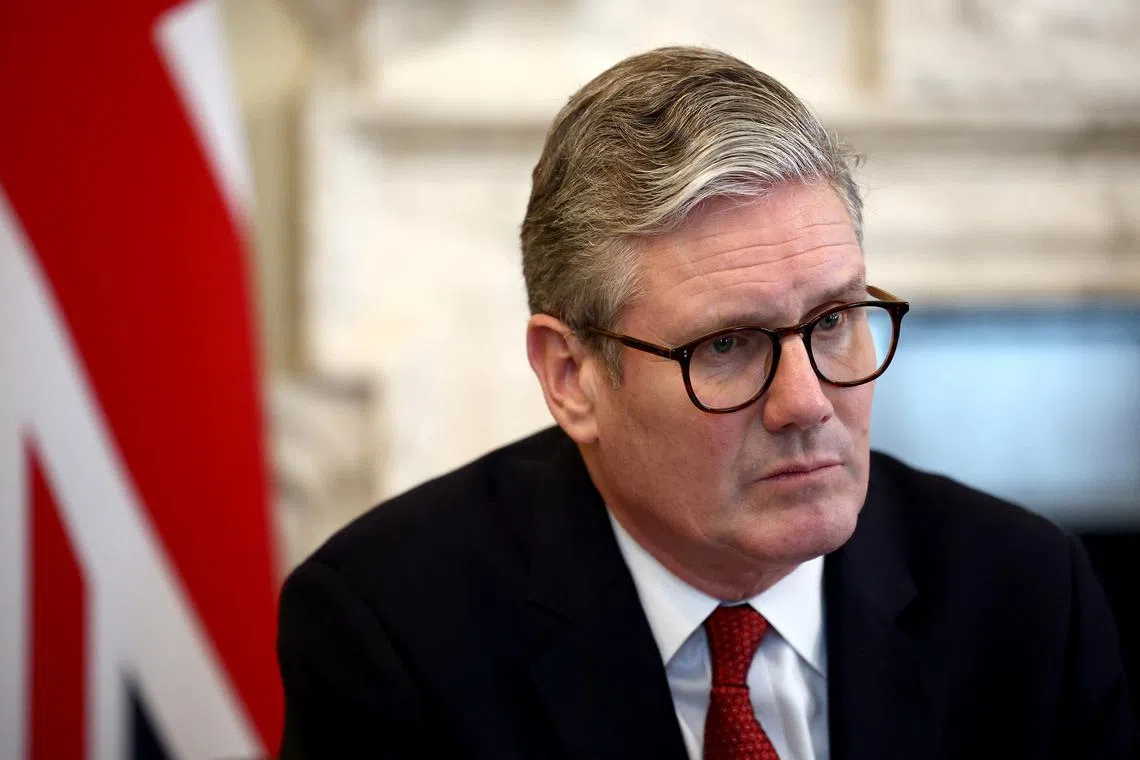PM Starmer warns social media firms after Southport misinformation fuels UK riots
Sign up now: Get ST's newsletters delivered to your inbox

Mr Keir Starmer said that the disturbances were not legitimate protests, saying it was criminal disorder that was "clearly driven by far-right hatred", before adding a warning to tech companies.
PHOTO: REUTERS
Follow topic:
LONDON – British Prime Minister Keir Starmer warned social media companies that they must uphold laws that prohibit the incitement of violence online, after misinformation around a fatal mass stabbing on July 29 sparked violent scenes.
A 17-year-old boy appeared the murder of three young girls
The disturbances followed the rapid spread of false information on social media that the suspect in the stabbings was a radical Islamist migrant, with anti-immigrant protesters descending on Southport from elsewhere, attacking the police and targeting a mosque.
British police will put extra officers on the streets across the country this weekend as they brace themselves for more potential unrest, officials said.
More than a dozen demonstrations by anti-immigration protesters are planned across Britain this weekend. Several counter-protests by those opposing racism have also been planned.
Mr Starmer said that the disturbances were not legitimate protests, saying it was criminal disorder that was “clearly driven by far-right hatred”, before adding a warning to tech companies.
“Let me also say to large social media companies, and those who run them – violent disorder clearly whipped up online... that is also a crime. It’s happening on your premises, and the law must be upheld everywhere,” he said at a news conference, adding there was a “balance to be struck” in handling such platforms.
Referring to social media platforms, he said: “It’s an amazing opportunity that we all enjoy... There is also a responsibility that goes with it. That’s a space for a mature conversation to take place.”
Blizzard of false information
Campaign group Hope Not Hate said that the riot in Southport on July 30 followed a “blizzard of false information around the attack, much of it circulated by far-right accounts online”.
The 17-year-old suspect was not initially named due to rules regarding children who are charged with crimes, before a judge subsequently ruled that the media could name him as Axel Rudakubana. He turns 18 on Aug 7 and the police have said he was born in Cardiff.
But a claim that the suspect was an asylum seeker or immigrant has been viewed at least 15.7 million times across X, Facebook, Instagram and other platforms, a Reuters analysis showed.
A false claim that he was an undocumented migrant who arrived in a small boat appeared on the website Channel 3 Now, which later apologised for publishing information that was misleading and not accurate.
Internet personality Andrew Tate on July 30 shared a picture of a man he said was responsible for the attack, with the caption “straight off the boat”. But the picture he used turned out to be of a 51-year-old man arrested for a separate stabbing in Ireland in 2023.
Separately, a Channel 4 analysis showed that 49 per cent of traffic on social media platform X referencing “Southport Muslim” – in reference to an unverified claim about the attacker’s religion – came from the United States, with 30 per cent coming from Britain.
The police have said the incident was not being treated as terror-related, and have urged people not to speculate on details while the investigation continues.
Mr Nigel Farage, leader of the right-wing Reform UK party, said he wondered “whether the truth is being withheld from us” as he questioned why the incident was not being treated as terror-related and asked if the suspect had been monitored by security services.
After criticism from several people including Mr Starmer’s deputy Angela Rayner, accusing Mr Farage of stoking conspiracy theories, Mr Farage said he thought his “gentle questions” were fair and reasonable, while adding that the internet had, at the same time, been awash with unfounded theories.
Mr Starmer declined to be drawn into commenting on what Mr Farage had said, reiterating that his focus was on the families and police officers impacted.
But he warned that any misinformation that interfered in the work of the authorities could jeopardise attempts to hold a fair trial.
“The price for a trial that is prejudiced is ultimately paid by the victims and their families who are deprived of the justice that they deserve,” he said. REUTERS

